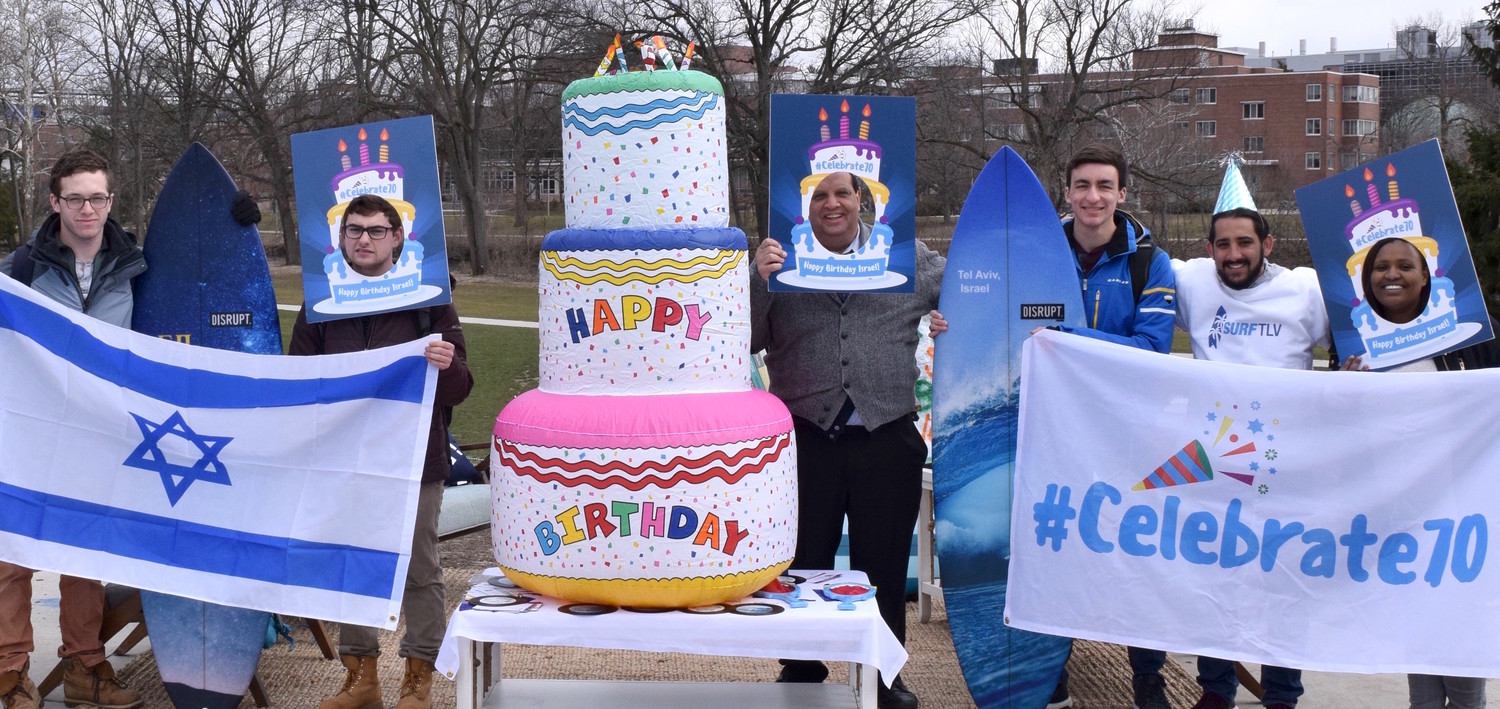At U.S. secular colleges, it’s partytime for Israel
In the weeks leading up to Yom Ha’aztmaut, pro-Israel students on more than 160 campuses across North America have been holding parties and celebrations for the Jewish state’s 70th birthday.
These festivities, which include birthday cakes and candles, balloons, music, posters and T-shirts, photo booths and even Tel Aviv-themed beach parties in California schools, are expected to reach millions on campus and online who have little or no knowledge of Israel, hoping to inspire a surge of pride for the Jewish homeland.
Alec Deer, a senior at the University of Iowa, told JNS, “We have planned a booth in the ‘population center’ on campus. We intend to have birthday cake, pictures and surfboards so students can enjoy the feeling of being in Tel Aviv while in Iowa City.”
According to Deer, the main goal of the party is “for students to see Israel in a positive light while having a discourse that allows them to better understand Israel.”
He said “many of the people on this campus have never left the country, let alone thought about going to Israel. It is our goal to show that it is not 100 percent war-torn, like shown on TV. That all over the country, people live normal day-to-day lives, just like we do here. What we see in the news is a small fraction of what actually happens there.”
Optimistic, Deer added that “I see a future where anti-Semitism on campuses is not an issue at all. I am lucky to attend a campus where anti-Semitic incidents are rare. It is my hope that all community members and leaders on campus can have a civil discourse, and we can learn to appreciate one another.”
The “Celebrate 70” effort is a collaborative one between various funding organizations, including Jewish fraternity AEPi, Artists for Israel, Committee for Accuracy in Middle East Reporting in America, Hasbara Fellowships, Hillel International, Israeli-American Council, Israel on Campus Coalition, Jewish National Fund, Masa Israel Journey, Milstein Family Foundation, StandWithUs, and Students Supporting Israel.
AEPi executive director Andy Borans said that the events will provide a powerful counter-narrative to a campus discourse in recent years that has been driven by Boycott, Divestment and Sanctions (BDS) resolutions, anti-Semitic assaults and displays, and the suppression of pro-Israel student’s free speech.
“For years, BDS has worked to slander Israel and attack its supporters on campus. On this special birthday, we will counter this hate by bringing to life the fun, passion and inspiration that emanates from Israel’s people and vibrant culture,” said Borans.
According to Borans, BDS movements reach only 10 campuses per year, while the Celebrate 70 parties will reach more than tenfold that number this April. “We are going way above the places that are being targeted by BDS to pre-empt BDS. We are getting the upper hand by first introducing pro-Israel [materials] and presenting that in advance so we are ahead of the game,” he said.
He emphasized that if the pro-Israel community puts the time and effort into disseminating positive education and material about Israel, as well as showing how BDS is “nothing more than anti-Semitism and anti-capitalism,” BDS will fail every time. But either way, he noted, “even after BDS votes pass, not one school has ever divested one penny from Israel.”
Dalia Breziner, a second-year student at the University of California-Berkeley, helped organize a carnival on her campus. “We will have multiple booths with many different activities, ranging from trivia to Israeli food-tasting, as well as a ‘Gratitude Wall,’ Israeli dancing and face-painting,” she described.
“We decided to hold a celebration for Israel’s 70th because we are proud Jews who advocate for the existence of a State of Israel,” she said.
While she maintained that Berkeley is often thought of as an anti-Semitic and anti-Israel campus, “it is a very safe environment,” and she has not experienced the effects of tahe BDS movement on her campus so far. “We hope that with this celebration, other students get a taste of the marvelous Israeli culture that we have inherited as our own and get a glimpse of our identities. We also hope this carnival enables Jewish and pro-Israel students to showcase their pride and to celebrate their own history.”
While Breziner noted that Berkeley “is a pretty phenomenal environment because of our vibrant student activism,” she said that often, “our narrative gets told to us. It is misconstrued and it is truly unfair, especially at a place like Berkeley.”
She voiced her hope that students in the UC system will “seek out further education on a highly sensitive topic prior to creating such strong opinions, and that they choose to engage in dialogue rather than create walls that further divide our student bodies.”
She stressed that she would like “people to be pro-Israel because of the shared values that Americans and Israelis hold. I would hope that they become spaces for dialogue and relationships to flourish.”
So far, Borans said the events that have already taken place have gone very well, without any significant anti-Israel pushback. “Where there was pushback, students have distributed educational materials, and most [naysayers] say that they were unaware and are impressed.”
Borans is optimistic about the future of pro-Israel life on North American campuses.
“By mobilizing and getting the word out, communicating with students one on one and making it fun, it’s just retail engagement. The future is very good.”

 44.0°,
Mostly Cloudy
44.0°,
Mostly Cloudy 




